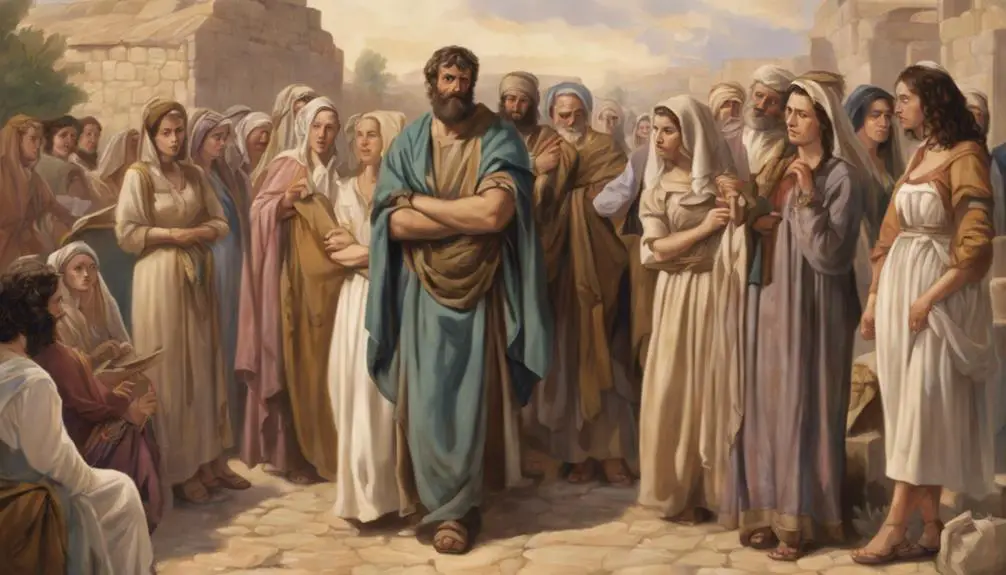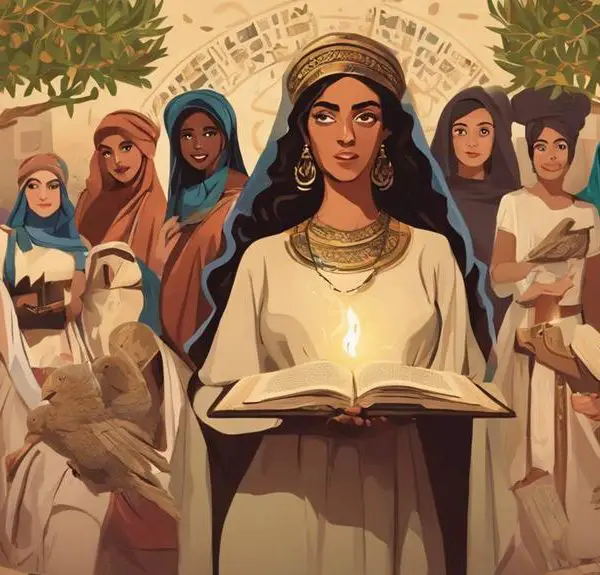Yearning to understand biblical womanizers like King Solomon? Explore the paradox of their wisdom and excesses in our enlightening discussion.
Womanizers in the Bible
Consider King Solomon, renowned for his wisdom, yet notorious for his multitude of wives and concubines. His seemingly contradictory actions raise an intriguing question: How do we reconcile the behavior of such biblical figures with our modern understanding of respect and equality in relationships?
Is there more to their stories that could shed light on this apparent paradox? Let's explore this complex issue together.
Key Takeaways
- Biblical figures like King Solomon, Samson, and David exhibit patterns of womanizing, leading to personal downfalls and societal disruptions.
- The stories of Delilah, Bathsheba, and Leah highlight the manipulative and victimizing dynamics in these relationships, often overshadowing their complexities.
- The narratives of Abraham and Jacob reveal societal pressures, favoritism, and gender inequalities in biblical relationships.
- These accounts serve as cautionary tales on unchecked desires, lack of discernment, and the destructive power of lust and manipulation.
King Solomon's Multitude of Women

Diving into the realm of King Solomon, you're bound to stumble upon his infamous collection of 700 wives and 300 concubines, a staggering number that firmly establishes him as a prominent womanizer in biblical history. Yet, it's critical to note that Solomon's Wisdom, often overshadowed by his marital escapades, played a significant role in his reign.
This wisdom, often considered divine, guided Solomon in his judgements, diplomacy, and writings. It's thought to be the reason behind his prosperous reign, and the source of his fame that even attracted the Queen of Sheba, a woman of potent intellect and power. Intrigued by reports of Solomon's wisdom, she visited him, posing riddles and questions, testing his famed discernment. Impressed, she left bearing gifts and a deep respect for Solomon.
However, Solomon's multitude of wives led to his downfall. His wives, mainly foreign princesses, introduced foreign gods, leading Solomon astray from his monotheistic faith. His wisdom, it appears, failed him in his personal life. Thus, Solomon's story serves as a reminder that wisdom, no matter how profound, can be undermined by personal weaknesses.
Samson's Weakness for Delilah
Moving to another notorious biblical womanizer, we encounter Samson, a man whose strength was unrivaled, but whose weakness for a woman named Delilah would eventually lead to his downfall. Samson's fatal attraction to Delilah was a significant component of his narrative, demonstrating the perilous consequences of unchecked desire.
Delilah's manipulation techniques were central to this narrative. She used her attractiveness and Samson's affection for her as powerful tools, repeatedly coaxing him into revealing the secret of his strength. Samson, blinded by his attraction, fell into her traps not once, but on multiple occasions. This demonstrates a significant flaw in his character – a lack of discernment and an inability to resist temptation.
Samson's downfall wasn't instantaneous, but rather the result of a gradual erosion of his resolve brought about by Delilah's persistent manipulations. Each time he succumbed to her, he moved a step closer to his downfall. This story serves as a cautionary tale about the dangers of lust and the destructive potential of manipulation, underscoring the importance of wisdom and discernment in relationships.
David, Bathsheba, and Adultery
Like Samson, King David, another prominent figure in the Bible, also fell prey to his desires, setting the stage for a tale of lust, deception, and adultery with Bathsheba. David's indiscretion, however, went beyond lust. It led to the manipulation of Uriah, Bathsheba's husband, and his eventual death, highlighting Uriah's victimhood.
- David's desire for Bathsheba was so strong that he orchestrated Uriah's death to cover up his adultery. Uriah, an innocent and loyal soldier, became a victim of David's lust and deception.
- David's remorse only surfaced after the prophet Nathan confronted him. It wasn't spontaneous guilt over his actions, but a realization that God was displeased. This remorse led David to repentance, but it didn't negate the consequences of his actions.
- Bathsheba's perspective is often overlooked, but it's important to remember she was a victim, too. She was taken by the king and later became a widow because of David's actions, enduring immense emotional trauma.
This tale underscores the complexity of David's character, demonstrating that even the most revered biblical figures are capable of grievous sins. It's a sobering reminder of the destructive power of unchecked desires.
Abraham's Relationships and Deceptions

In the tangled web of Abraham's relationships and deceptions, you'll find a biblical narrative that's fraught with moral ambiguity and complex implications. A key feature of this narrative is Abraham's polygamy, which challenges our modern monogamous norms. You'll note that Abraham had two wives – Sarah and Hagar. This was an accepted practice in those days, reflecting the patriarchal societal norms.
Yet, the dynamic between Abraham, Sarah and Hagar wasn't without its tensions. Sarah, who was unable to conceive, offered her servant Hagar to Abraham. This highlights Sarah's subordination and the pressures she faced in a society that prized fertility.
Abraham's deceptions further complicate this narrative. Twice, he deceived powerful rulers by passing off Sarah as his sister to protect his own life. This not only exposes his duplicitous nature but also illuminates the power dynamics and gender inequalities inherent in biblical times.
Jacob's Love Triangle With Leah and Rachel

Shifting our focus to another notable biblical character, consider Jacob's tumultuous relationships with Leah and Rachel, which presents yet another intricate tale of love, deceit, and divine intervention. This narrative, as presented in the Book of Genesis, is replete with human emotions and divine interventions, shaping Jacob's life and his descendants'.
- Jacob's Favoritism: Jacob's love for Rachel was profound, more so than for Leah. This favoritism was blatant, causing significant emotional turmoil within the family. Jacob worked for seven years to marry Rachel, but was tricked into marrying Leah first, and had to toil another seven years for Rachel.
- Leah's Struggles: Leah, though unloved, was blessed with children. She bore Jacob six sons and a daughter, hoping this would earn his affection. However, Jacob's favoritism remained unmoved.
- Divine Intervention: Seeing Leah's struggles, God opened her womb while Rachel remained barren. This divine intervention highlighted the importance of Leah's role in the formation of the twelve tribes of Israel.
In this narrative, you're confronted with the rawness of human emotions, the consequences of favoritism, and the divine intervention that promises to rectify injustices. It's a tale that transcends time, offering profound insights into the complexities of human relationships.
Frequently Asked Questions
Are There Any Biblical Figures Who Were Monogamous Throughout Their Lives?"
Yes, there were biblical figures who exemplify monogamy symbolism throughout their lives. For instance, Isaac, son of Abraham, remained faithful to his wife Rebekah. He's often cited as a chaste biblical figure.
Additionally, Joseph, despite being tempted by Potipar's wife, maintained his fidelity. These examples remind us of the importance of commitment and faithfulness, reinforcing the biblical principle of monogamy.
What Are the Consequences Faced by These Biblical Figures Due to Their Womanizing Behavior?"
You're asking about the repercussions faced by certain figures due to their womanizing actions.
Well, the Bible often presents a narrative of a 'Womanizer's Redemption.' These individuals typically face severe 'Biblical Punishments,' including loss of power, family strife, or even death.
Their stories serve as cautionary tales, showing that while they may have strayed, they often seek forgiveness and strive to correct their ways.
How Does the Bible, Overall, View the Act of Womanizing?"
The Bible's stance on womanizing isn't explicitly stated, but it's not condoned. Stories of womanizing prophets and instances of biblical polygamy often end in strife. You'd see that even revered figures who indulged in these practices faced significant consequences.
It's clear that the Bible, by illustrating negative outcomes, discourages such behavior. It promotes respect and monogamy, emphasizing the importance of a loving, committed relationship.
Are There Any Teachings in the Bible That Discourage Womanizing Behaviors?"
Yes, there are teachings that discourage womanizing behaviors. The Bible frequently highlights the consequences of promiscuity. In Proverbs, for instance, it warns against the dangers and pitfalls of loose living.
It advocates for marital fidelity and underscores the importance of maintaining moral purity. So, it's clear that biblical morality doesn't condone any form of womanizing, but rather, it urges you to uphold respect and faithfulness in your relationships.
How Did the Women in These Stories React or Respond to the Womanizing Behaviors of These Biblical Figures?"
You'll find examples of feminine resistance and empowered responses throughout these narratives. Women often exercised agency, challenged the status quo, and charted their own paths.
They weren't passive victims but active participants who responded in diverse ways, from subtle manipulation to open confrontation. This reveals the complexities of their experiences, showing us they were far more than mere objects of male desire.
They actively shaped and influenced their own stories.
Conclusion
In conclusion, you've explored the tales of Biblical womanizers. You've seen Solomon's harem, Samson's downfall, David's adultery, Abraham's deceptions, and Jacob's love triangle.
It's clear, these men were flawed, succumbing to their desires, but also faced consequences. Their stories serve as cautionary tales, illustrating that power, lust, deceit, and favoritism can lead to downfall. They prompt you to question, to analyze, and to understand the complexities of human nature within a Biblical context.



Sign up